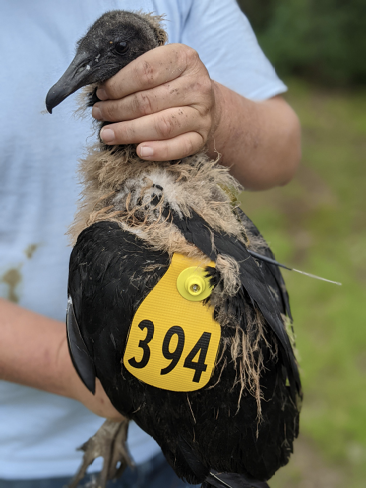Thomas W. French

The Black Vulture chick, with its patagial wing tag and radio transmitter, is ready to go. Photograph by Thomas W. French.
Black Vultures (Coragyps atratus) are still an uncommon sight across most of Massachusetts, but their numbers are increasing. The first documented sighting of a Black Vulture in Massachusetts occurred in Swampscott in November 1850, but it was not until 148 years later, in 1998, that Norman Smith found the first documented nest on a rocky ledge in the Blue Hills in Milton. Since then, the summer range of Black Vultures has continued to spread north, but nests have been difficult to locate in Massachusetts. To date, MassWildlife has become aware of only six nesting locations: the Blue Hills in Milton; the Palmer Wildlife Management Area (WMA) in Palmer just west of the Warren town line; the attic of an abandoned building in Sunderland; two locations in the southern Berkshires, including at least one in Sheffield; and, as described here, Mount Tekoa in Montgomery. All these nest sites, except the one in Sunderland, have been in cave-like shelters created by boulders. Undoubtedly there are additional nest sites across the state, especially in the southern Berkshires, where 77 Black Vultures, a state record, were counted in Sheffield on January 1, 2016 (Hayward and Stymeist 2018).
To view the rest of the article you'll need to
subscribe. Bird Observer publishes original articles on birding locations, on avian populations and natural history, on regional rarities, field notes, field records, photographs, and art work.